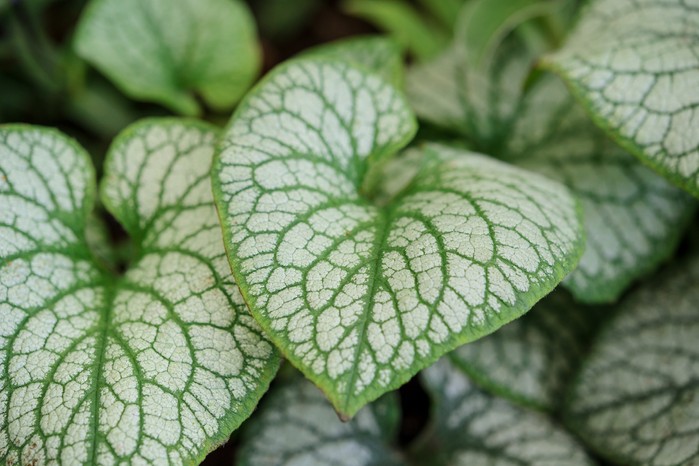
Brunnera is the perfect ground cover plant for a shady spot. This hardy perennial has tiny bright blue flowers that will light up gloomy areas for a long period in spring, The leaves are also an attractive feature and vary depending on which variety you grow, but if you’re looking for impact, try ‘Jack Frost’, which has heart-shaped, silvery leaves.
For low-maintenance planting brunnera is hard to beat. It’s a low-growing plant that forms small mounds and looks good for most of the year, apart from winter when it dies down. Brunnera doesn’t suffer from any major pests or diseases so it makes a great alternative to growing hostas if you have a lot of slugs and snails in your garden.
How to grow brunnera
Grow brunnera in moist, well-drained soil in a cool area of your garden. Water newly planted plants regularly until they have established, especially if planting in hot weather. Cut off any brown leaves throughout the season, and deadhead in autumn. Lift and divide every two to three years, in early spring or autumn.
Where to plant brunnera
Brunnera macrophylla ‘Jack Frost’
Grow brunnera with other shade-loving spring plants – flowering perennials such as hellebores, vinca and spring bulbs or for foliage contrast you could try ferns and ajuga. The foliage of varieties like ‘Jack Frost’ makes a dramatic impact and will help light up shady borders. Brunnera will thrive in woodland plantings or beneath trees in dappled shade. It will look good at the front of the border, under trees or planted by the side of a path.
More like this
How to plant brunnera

Planting brunnera in a pot
Plant brunnera in the spring or autumn if possible, when the soil is warm and the weather is not too hot. It’s fine to plant at other times of year, but avoid planting in very hot conditions as the plant will struggle or when the ground is frozen.
Remove any weeds, then dig a hole the same depth as its container and a little wider. Loosen the soil at the bottom of the hole. Place the plant in the hole, with top of the root ball level with the soil. Fill in around the plant with compost. Firm it in well with your hands and give it a good water.
Brunnera can also be planted in containers and looks good combined with taller flowering perennials. Plant to the level it was in its pot, so that the top of the root ball is level with the surface of the compost. Firm the plant in well and water it. Once the plant gets too big for your container it can be planted out in the border.
How to care for brunnera

Brunnera macrophylla ‘Jack Frost’
Brunnera is a low-maintenance plant. If you plant it in the right place it won’t need much attention aside from dividing overgrown clumps every few years. Water new plants regularly until they have established, especially if you have planted brunnera in the spring or the weather is hot. Cut off any brown leaves and deadhead in the autumn.
Dividing brunnera

Dividing crowns of perennials
Lift and divide every two to three years. This can be done in early spring or autumn. To divide a clump, lift it carefully using a garden fork. Split the clump in half using a spade, then replant the sections. If the plant is small, you may be able to pull apart sections with your hands. Make sure each clump has a good set of roots.
Advice on buying brunnera
- Brunnera are available to buy as young plants from garden centres and specialist nurseries
- If you buy and plant brunnera in the autumn, the plant will have time to get established in time for its flowering season in the spring
- Check plants for signs of damage or disease before planting
- Buy a good sized plant, around a 2-litre pot, if possible, as larger plants will establish faster than small ones
Where to buy brunnera
Varieties of brunnera to grow

Brunnera macrophylla ‘Jack Frost’
Brunnera ‘Jack Frost’ – one of the most popular varieties for its silvery leaves and bright blue flowers. A good pick to light up a shady spot.
Brunnera ‘Betty Bowring’ – a slightly more compact variety with small white flowers on tall stems that appear above green leaves. The leaves are smaller than other varieties and less of a feature.
Brunnera ‘Variegata’ – the leaves of this variety are edged in cream with sprays of vivid blue flowers in the spring.
